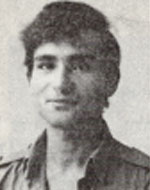Eliyahu, son of Hasiba and Shalom, was born on December 31, 1949 in Casablanca, Morocco, and immigrated with his parents to Israel in 1955. Eli, as he affectionately called his family and friends, was interested in working with people from his childhood and was sensitive to their fate, their suffering and their joys. He always helped out where ever he was needed helped his parents at home, his friends at school, and even a stranger he met on the street. In Kiryat Malachi he set up an exceptional educational project and established a branch for Bnei Akiva, , Which brought together abandoned young men and women who were on the brink of moral decline and organized them into collective action He took them on trips to Israel, to places of tourism and to places of interest, accompanied them during their adolescence, and sought solutions to their problems, in the nest he founded with them every Shabbat and every hour he was free from yeshiva studies. , Or instructed the youth how to build them, and stubbornly and persistently managed to overcome all the technical obstacles and won the admiration of his friends and the admiration of the boys and girls he took under his wing and never lost hope, even in the face of great difficulties. Sought perfection, and strove in an unrelenting struggle to fulfill the task he had undertaken. With the help of his friends he built the building of the movement’s nest and most of the work and responsibility he undertook.
Eliahu was drafted into the IDF in mid-August 1968. After completing basic training, he completed a series of courses, including a sniper course, a course for half-track drivers, a training course for infantry officers and a reconnaissance course. . Afterward, he also took a course in reconnaissance officers. During his service in the army, he was transferred to the Armored Corps and assigned as commander of a tank division in one of the armored corps units. His friends in the army were like brothers, and they loved his heart and soul. One of his friends told him that he had a great will, and that, despite severe pain in his back, he refused to give others his share of the team’s work, even though they asked him to stop exertion and effort. He adhered to his goals stubbornly, despite the physical and mental difficulties, for which he was able to gain many concessions. His friends praised the order and diligence of his work, his meticulousness with every detail and his professionalism and self-confidence. He was always clean and polished, always preparing everything in time. During his vacations from the army he used to travel to Israel, and sometimes even visited various places in the northern sector of the region, on which his unit was weak. Much of his free time had been devoted to matters that had to do with his military role, for the job and the perfect execution were at the top of his concerns. When the Yom Kippur War broke out he was sent to the Sinai front with his unit. He fought in the swampy swamps and, despite the objections of his commanders, came out wounded to rescue our pilot, who seemed to be falling into enemy lines. He participated in many battles, was injured several times but continued to fight. On October 11, 1973, he fell in battle in the “Braga” area, in the central sector of the Suez Canal. He was brought to eternal rest in the Mount of Olives cemetery in Jerusalem. Survived by his parents, three brothers and a sister. After his fall, he was promoted to the rank of captain, and was given a citation for his fighting and his standing in battle. In the Yom Kippur War, Captain Eli Ran served as a tank commander, and on October 6, 1973, he moved in his tank in the area north of Kantara until the tank was hit and he was wounded Captain Eli Ran managed to get out of the damaged tank, And moved on foot until he reached the forcesJan. Despite his injury, he went to another tank and continued fighting. Two days later he was hit and fell. In doing so, the late Captain Eli Ran discovered that he was adhering to the mission. ” His family donated a Torah scroll to commemorate the late Eli’s name.
